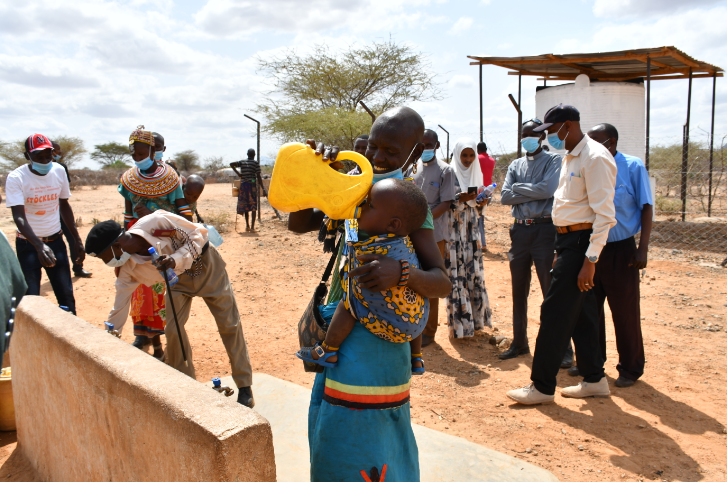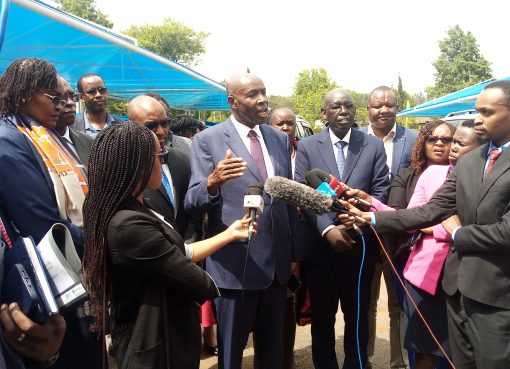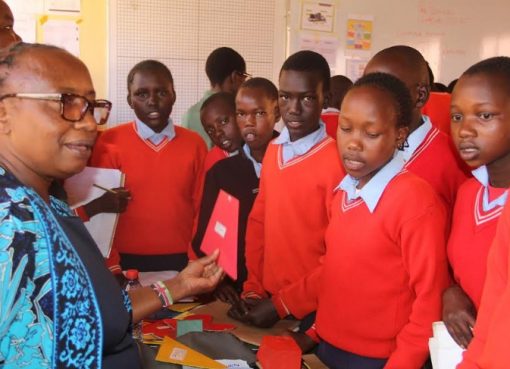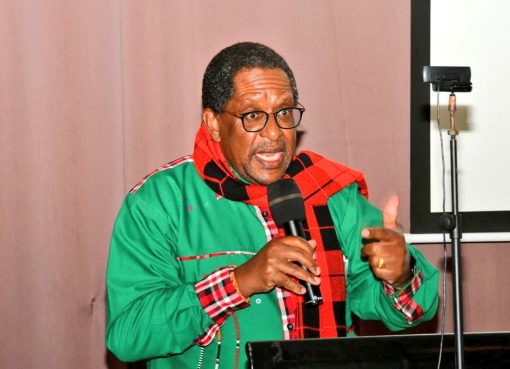In one of the remote parts of Marsabit County, Nairibi Sub-location in Laisamis Constituency, the Anglican Church is transforming lives of a community that has experienced water crisis for many years, by availing the precious commodity to them.
In conjunction with the National Water Management Authority (WARMA) for technical support, the Church through its Enhanced Access to Reliable Water Supply and Sanitation for Economic Development programme has undertaken water projects that have seen over 1,000 households access portable water.
Residents of Nairibi area have a reason to smile following successful implementation of water connected projects funded by the Bread for the World and UKAid at a cost of Sh57.7 million.
The Anglican Development Services of Mount Kenya East (ADS-Mt Kenya East) is the implementing Agency and has done piping of more than three kilometers, besides providing livestock watering troughs that also serve herders transiting in the area.
Programme Coordinator for Marsabit Region, Mr Dub Garbicha, said the intervention was informed by the desire by the Church to assist the community in accessing clean water and mitigate against poverty.
Mr Garbicha noted that water is key to a healthy living, adding that the residents were overwhelmed by water-related diseases and conflict as the community members fought for the rare commodity, though saline.
“These projects have had great impact in peace building, as availability of adequate water promotes good co-existence among these pastoralist communities,” he said, adding that enhancement of food security and supporting of a conducive learning environment for children, was also a key driving factor.
Mr Garbicha made the remarks during the commissioning and handing over of the projects to the community at Nairibi.
He pointed out that water scarcity in Marsabit was a big challenge because the largest portion of the county is arid.
According to the Co-ordinator, a study by the organization established that most residents of Marsabit have to trek long distances in search of the precious commodity which is not only tiring but also a drain on their useful time.
He told KNA that the high levels of illiteracy among women in the region, is linked to the water shortage problem as girls spend their valuable time fetching water and end up dropping out of school.
The boy child is also not safe as he has to undertake the chore of taking livestock to watering points which are situated far away from where they attend school.
An almost tear drawing story on how pupils at two local primary schools underwent agonies of urinary tract and skin diseases owing to lack of safe water is at hand with virtually every resident.
The Nurse-In-Charge of Nairibi Dispensary, Joseph Lemong, narrated how the facility used to be flooded with cases of learners from Nairibi and Lontolio Primary Schools, seeking treatment for uremia because of using contaminated water from saline wells.
“We used to receive many pupils here with urinary infections, with some urinating blood and stone like obstructs,” he said, adding that the problem has been addressed following the rehabilitation of a borehole at Nairibi that had been in a state of disuse for several years after it broke down.
Mr Lemong also disclosed that skin infections, including scabies were a bother not only to pupils but other residents as well before the presence of the ADS in the area.
The intervention, Mr Lemong says would also greatly check on malnutrition, especially among children, lactating and expectant mothers as the residents were now able to grow vegetables and fruits at their kitchen gardens for improved diet.
He acknowledged that the availability of water through ADS was an effective intervention against the Covid-19 pandemic, as the residents were now able to maintain cleanliness and hygiene as advocated by the Ministry of Health.
“Given that sanitizers are hardly available in these remote areas, members of this community can now comfortably wash their hands with soap because running water is readily available,” said Lemong.
The Anglican Church of Kenya Marsabit Diocese, Bishop Wario Qampicha, who graced the occasion called for partnership approach in addressing the water scarcity problem in the County.
The Bishop expressed happiness that the residents could now productively use their valuable time that was previously spent in walking long distances to look for water which has now been reduced to 15 minutes to better their lives.
The households were now accessing wholesome water at a nominal fee of Sh100 per month irrespective of the amount of water one draws from the 2,800 liters per hour, yielding borehole.
“Resources are limited and this calls for partnerships and pulling of funds together by stakeholders in this sector if the water problem is to be alleviated in this County,” he noted.
Marsabit Water Resources Authority (WARMA) was at hand during the implementation of the programme, especially in capacity building the communities on best management and conservation of water resources and protection of the environment.
WARMA County Co-ordinator, Hussein Guyo, lauded the project, saying that innovations displayed by ADS when undertaking the projects, would ensure its sustainability as there was community ownership.
The organization has performed more than 20 water restoration projects in Marsabit South Sub- County, that include construction of three check dams along the seasonal Nairibi river and building of tanks and fitting of gutters in schools and health centers.
Others include a water pan, kitchen gardening, the promotion of integrated water management and hygiene and the rehabilitation of water kiosks plus setting up of solar power boosters.
Gabions on seasonal rivers have also been constructed for both soil erosion control, land reclamation and ground water retention purposes.
One important lesson that the ADS learnt during the task that started in 2018 was never to spread resources thinly with an attempt to implement projects in many areas.
The message being that the plan should always be to focus on one area and to entirely implement a project by taking into consideration all its components.
A villager at Loripa, Naipiria Lenawalchiget was all praises to the donor and the technical support given by the government, saying the co-operation witnessed was impressive.
Ms Lenawalchiget said the residents were happy lot for being provided with clean water as it had lessened the burden of walking to far places in search of the commodity which they could at times miss out.
“We now have unlimited access to safe water for domestic and livestock use,” she said as she quenched her one-year-old child’s thirst with water brought to her door step through piping from Nairibi 2.5 kilometers away.
By Sebastian Miriti





